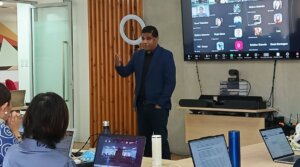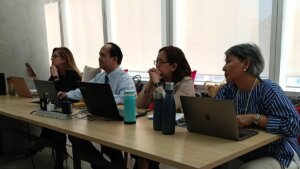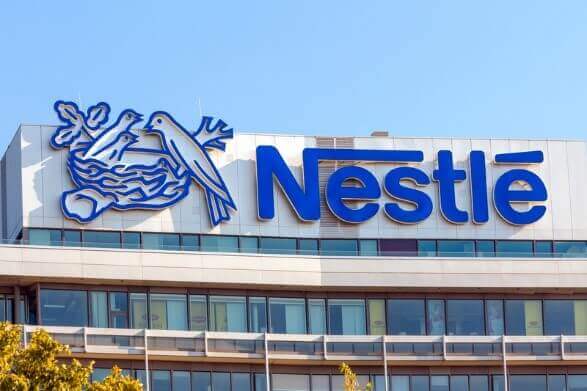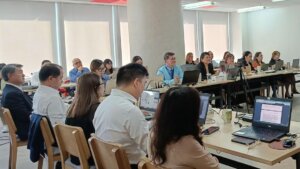The April 2 session of our Executive MBA program focused on how companies can drive innovation while creating meaningful impact—an increasingly vital balance in today’s complex business landscape. Participants explored how global brands adapt to disruption, respond to evolving consumer demands, and embed sustainability into their core strategy.
Before diving into the case study, we were delighted with a talk by Gokul Gopalakrishnan, Senior Vice President and Business Head for Asia at Uniphore. Gokul shared Uniphore’s latest milestones and highlighted a future where artificial intelligence and human empathy work together to transform customer experience. He discussed how their conversational AI tools, such as U-Assist and U-Analyze, empower organizations to move beyond traditional service models and deliver intelligent, emotionally attuned, and revenue-generating interactions.


The case study that followed centered on Nestlé and its transformation in the face of disruption—an inspiring example of how a legacy company can evolve with purpose.
Balancing Scale, Sustainability, and Innovation
In today’s rapidly changing world, the companies that will thrive long-term can innovate while taking genuine responsibility for the planet. Nestlé, one of the world’s largest food and beverage companies, is proving that scale and sustainability don’t have to be mutually exclusive.
Looking back at 2020—a year marked by global disruption—Nestlé found itself at a crossroads. Under CEO Mark Schneider’s leadership, the company didn’t just weather the storm—it used the moment to fast-track a transformation that’s still unfolding today.
And as someone who keeps an eye on how legacy brands evolve in the modern age, I think Nestlé’s approach offers some powerful lessons.
Adapting to Disruption with a Forward-Looking Lens
Despite market headwinds—foreign exchange issues and strategic divestitures—Nestlé pulled off organic growth, especially in the Americas. What stood out was how they didn’t just double down on their legacy products but expanded into fast-growing, future-facing sectors like:
✔️ Plant-based foods
✔️ Personalized pet nutrition
✔️ Direct-to-consumer and digital-first models
That kind of strategic agility is no small feat for a global player. It shows a clear understanding of both risk and opportunity—something I think more traditional companies could learn from.
Innovation That’s Grounded in Consumer Shifts
Nestlé’s focus on health and sustainability came through clearly in their product innovation. A few highlights:
💡 Coffee: With CHF 19B in revenue, their coffee line didn’t just grow—it evolved. Think eco-friendly Nespresso pods and organic blends.
💡 Pet Care: Purina hit 10% growth, thanks to tech-enabled, customized nutrition for pets. Tailored pet food based on gut health? That’s the future.
💡 Plant-Based: Nestlé’s alt-protein line hit CHF 700M, with smart launches like Wunda, a carbon-neutral, pea-based dairy alternative.
This tells me one thing: Nestlé isn’t just reacting to trends—it’s helping shape them.
Meeting Consumers Where They Are
COVID fast-tracked a shift in consumer behavior: more e-commerce, more health-conscious choices, and greater demand for transparency. Nestlé adapted by:
📢 Boosting digital engagement and direct-to-consumer channels
📢 Pivoting toward wellness-focused products—immunity, sleep, stress, aging
It’s one thing to have data. It’s another thing to act on it. Nestlé did both.
Taking Climate Action Seriously
Of course, you can’t talk about the future of food without talking about sustainability. Nestlé’s supply chains face real risk from climate change, droughts, floods, and biodiversity loss. Their response has been comprehensive:
🌍 Net-zero emissions by 2050 (with 2030 and 2025 milestones)
🌍 22 million tonnes of CO₂ to be cut through regenerative agriculture
🌍 Support for 500K+ farmers to shift to climate-resilient practices
By 2020, 95% of their factories were already zero-waste, and 50% of their electricity came from renewables. Ambitious? Definitely. Necessary? Absolutely.

Final Thoughts: Can Growth and Impact Coexist?
In my view, Nestlé’s “Creating Shared Value” approach is what more companies need to embrace. They’ve embedded ESG principles into their core strategy—not as an afterthought, but as a growth engine.
Of course, they still face criticism—plastic waste, sourcing practices, product healthiness—but they’re transparent about those challenges and actively working to improve. For me, that’s what leadership looks like in this era: not perfection, but progress with purpose.
Explore the Future of Sustainable Food Innovation
Nestlé’s approach to sustainable food innovation highlights how leading companies are driving change. If you’re looking to incorporate sustainability and innovation into your business strategy, John Clements Consultants can help.
Contact us today for expert guidance on transforming your business.






